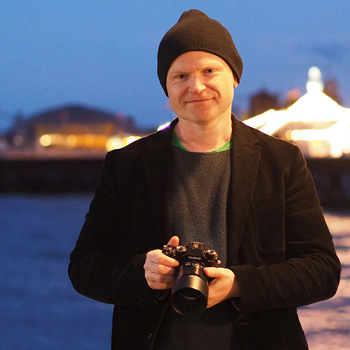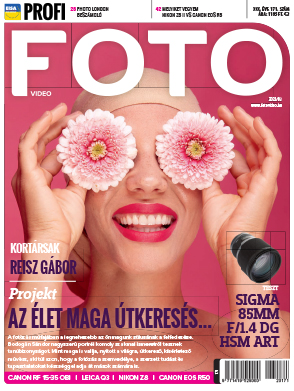Gordon Laing’s homepage, Cameralabs.com is a place for many thousands of photographers who are looking for detailed, in-depth reviews of cameras and lenses, especially for those who prefer learning about real life experiences instead of boring pixel peeping and tech talk. Besides writing these practical, useful reviews, Gordon, a citizen of Brighton, has just written a book about photographing in JPEG and how to do it well. Illustrated with a hundred of super photos made by the man himself, the book proves that modern cameras have such great JPEG engines that anyone can take the photos she or he wants to. Norbert Uzseka, the journalist of FotoVideo, a Hungarian magazine, interviewed Gordon.
In Camera, your first book on photography, has been published some months ago. How would you describe it to someone who've never heard of you and your website?
GL: It's a book for anyone who wants to take photos without worrying about Photoshop or working on a computer later. Whether you're a beginner or an expert who wants to recapture a pure approach to photography, it's about embracing modern technology and classic techniques to get the result you want all in-camera!
Many photographers say, JPEGs are the devil because of in camera sharpening and loss of details, and you can get the most and best details from RAW. So, why should anyone take photos in JPEG?
GL: I always recommend shooting in RAW+JPEG so you have the RAW for backup in case you decide to post-process now or in the future. But I always aim to achieve the effect I want in-camera so that I don't need to post-process. Modern JPEG engines have improved a lot and on some cameras they're as good - or better - than the results I can achieve with processing RAW files.
Now, In Camera isn't really about the gear. Opposite to a lot of photo books, you show all the technical data, but the main thing is about how and where you made these photos. What made you write this book?
GL: Several things were happening which inspired me to write the book: first, JPEG engines were getting better and better and I was finding I could achieve the result I wanted without wasting time processing RAW. Secondly, mirrorless cameras were providing excellent feedback as you composed the image, so there was literally no excuse for getting it wrong - if it didn't look right, you could fix it there rather than later. And third, I was noticing a surprising number of photographers saying they'd fix problems later when they could in fact just fix them now by changing a setting or adjusting the camera in some way. I felt traditional techniques were being lost in favour of post-processing. Whenever I'd post my photos, people would also ask what Lightroom preset I'd used, or how I'd processed it, as if it were the only route. They almost didn't believe they were always in-camera JPEGs. So I set out to prove you can often achieve the effect you want without post-processing. I always say do what works for you. Do what you enjoy too. If you like or need to post-process, then go ahead, but don't assume it's necessary for all images and all photographers.
Why did you decide to write this book this way?
GL: I tried to write a book I'd want to read! I love flicking through photo books and being inspired by the composition, but equally I want to know about the location and the technical settings, and the reasoning behind it. I feel a lot of photographers share fabulous images, but never tell us anything about them. I don't think they're deliberately avoiding the background, but I want to know the full story. That's why I wrote the book this way, but kept each as a separate story so it was easy to flick through like a cookery book.

I got acquainted with Cameralabs.com when I was trying to decide on my first interchangeable lens camera, and it became one of (if not the one) my favorite site about cameras because of the really useful reviews, that tell about real life experiences, not just boring pixelpeeping. Could you please tell me about how you became a photographer and how you started your website?
GL: I've been into photography since early childhood. I love how it satisfies both the artistic and scientific sides of a person, and also encourages you to look at everything around you. Professionally, I became a journalist after studying Physics at University, and specialized in camera reviews, first for magazines, then later online. I've been a journalist for 25 years now and a photographer almost my entire life, so the two have worked side-by-side. Cameralabs has been running for 12 years now! I started it as a place where I could write really long reviews!
Who were and are your biggest influences as a photographer?
GL: I love the real-life details, moments and sense of humour captured by American photographers like William Eggleston and Stephen Shore, and British photographer Martin Parr. Many of my friends have inspired me too, particularly in the fields of astro photography and long exposures. Surround yourself with inspiration!
It's clear that you travel a lot. If it's too personal, don't reply, but: is it your full time job to write reviews and travel, can you afford it, or you're just well backed by some camera manufacturers? :)
GL: I'm not backed by anyone! Cameralabs is funded by the readers when they buy through my links to Amazon or B&H, or make a coffee donation, or buy my book! Travel is my great love, so I spend as much of my money and time on it as I can. I trade luxury for longer and more trips! Who needs a nice hotel when all the action is outside of it!
Your book is full of beautiful photographs, and very useful tips and advice that can be used by everyone, not only those who own the same gear with which you took that very photo. You used almost every mirrorless system, apart from Nikon/Canon/Pentax, yet I wonder, what are your favorite gears?
GL: I've been shooting mirrorless for my personal work since they first came out, starting with Micro Four Thirds, then later trying Sony, then Fuji, then the rest! Today I have settled on three main systems: Olympus and Fuji for general use, and Sony for sports and action. You'll notice most of the shots in the book are from Olympus and Fuji cameras because they're what I normally travel with and I think they have the best JPEG engines.

From your reviews and videos you seem to be a very smooth guy in the best sense, a gentleman who's honest but kind, like someone you'd want to be friends with. Yet, I see no photos of humans, no portraits in your book, and there are more than hints in the text that you dislike tourists who flood the places where you'd like to take photographs. I can't but agree, but the question is: why there are more or less no humans on your photos in this book?
GL: I'm not very good at taking photos of people! I'm quite shy!
Even from your website it was clear that you love beautiful places, close or far away. You often take photos of your now home town, Brighton, and you go to a lot of places to where I'm sure every photographer would love to go. Why are (urban and nature) landscapes your favorite subject in photography?
GL: I just photograph whatever looks nice or interesting to me, and that's invariably landscapes, urban scenes and food!
Could you please tell me about your usual method of going on a photo trip?
GL: Most of my photos are taken on big family road trips where we visit lots of locations. Some we know about and plan to visit. Some we simply come across en-route. It's all about the journey!
There are three photos in your book that you took in Budapest, where I live. What do you think about the city?
GL: I have visited Budapest about five times now and I love it! I have also driven through Hungary twice, so feel I know it fairly well as a tourist. I am of course drawn to the big views over the river or around Parliament, and also find the ruin pubs fun to visit. But I also love trying to find areas where there are less tourists, or nice cafes. A wonderful city - and country - I look forward to visiting again soon!

I'm sure there are still parts of the world where you haven't been to but would love to go to. What are those places?
GL: I have never been to Egypt and would love to visit. I'm also fond of the far North and while I have been to Alaska and Norway, I'd like to go as far North as I can!
What are the best and worst parts of writing reviews?
GL: When you finish one, you get started on another. So it can feel like a factory production line, but I cannot complain as I love trying out the new products! It's also sad when a camera you love has to be returned to the company, but there's always another nice one not far away! (all review cameras are loaned for about 2 weeks, then sent back)
What was the biggest reward and surprise that you faced as a reviewer and/or a photographer?
GL: I love hearing from people who've found a camera from a review that really inspires them to shoot and pursue their hobby or dream or even start a profession.
Have any of the manufacturers ever asked your opinion when designing a new camera or lens?
GL: Yes, various manufacturers on a number of occasions have asked for feedback or suggestions. Most are very open and willing to listen, particularly the mirrorless companies.
Thank you very much!
GL: You're welcome! Thanks for taking an interest in my book and my work!
Photos reproduced with permission from cameralabs.com

( - )







